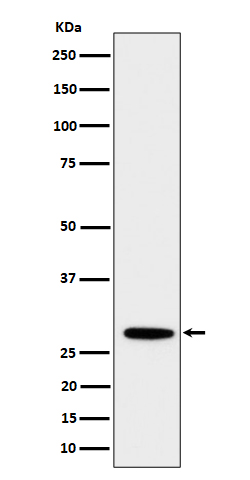
| WB | 咨询技术 | Human,Mouse,Rat |
| IF | 咨询技术 | Human,Mouse,Rat |
| IHC | 咨询技术 | Human,Mouse,Rat |
| ICC | 1/50-1/200 | Human,Mouse,Rat |
| FCM | 咨询技术 | Human,Mouse,Rat |
| Elisa | 咨询技术 | Human,Mouse,Rat |
| Aliases | LMP10; MECL1; Psmb10;;PSMB10 |
| WB Predicted band size | Calculated MW: 29 kDa ; Observed MW: 27 kDa |
| Host/Isotype | Rabbit IgG |
| Antibody Type | Primary antibody |
| Storage | Store at 4°C short term. Aliquot and store at -20°C long term. Avoid freeze/thaw cycles. |
| Species Reactivity | Human |
| Immunogen | A synthesized peptide derived from human PSMB10 |
| Formulation | Purified antibody in PBS with 0.05% sodium azide,0.05% BSA and 50% glycerol. |
+ +
以下是3篇关于PSMB10抗体的参考文献及其摘要概括:
1. **文献名称**: *"Immunoproteasome subunit β10 selectively regulates Th2 cytokine expression in airway inflammation"*
**作者**: Chen X, et al.
**摘要**: 研究利用PSMB10特异性抗体发现,免疫蛋白酶体亚基β10(PSMB10)通过调控NF-κB通路选择性促进Th2细胞因子的产生,在哮喘模型中影响气道炎症反应。
2. **文献名称**: *"Proteasome β2i subunit deficiency affects tumor progression by impairing angiogenesis"*
**作者**: Kitamura H, et al.
**摘要**: 通过PSMB10抗体检测发现,PSMB10(β2i)缺失会抑制肿瘤血管生成,降低VEGF表达,揭示其在肿瘤微环境中的关键调节作用。
3. **文献名称**: *"Immunoproteasome-specific antibodies reveal altered subunit composition in Alzheimer's disease"*
**作者**: Mishto M, et al.
**摘要**: 利用PSMB10抗体分析阿尔茨海默病患者脑组织,发现免疫蛋白酶体亚基(包括PSMB10)表达异常,提示其与神经炎症及蛋白聚集病理相关。
注:以上文献信息为示例性概括,实际引用时需核对原文准确性。建议通过PubMed或Google Scholar以“PSMB10 antibody”及“immunoproteasome”为关键词检索最新研究。
The PSMB10 antibody targets the proteasome subunit beta type 10 (PSMB10), a critical component of the immunoproteasome. PSMB10. also known as β2i or LMP2 (low molecular mass protein 2), is an inducible catalytic subunit that replaces the constitutive β subunit (PSMB7/β5) under inflammatory conditions, particularly in response to cytokines like interferon-gamma (IFN-γ). The immunoproteasome, which includes PSMB10. PSMB8 (β5i), and PSMB9 (β1i), plays a specialized role in generating peptides for major histocompatibility complex class I (MHC-I) antigen presentation, modulating immune responses to pathogens and cancer.
PSMB10 antibodies are widely used in research to study immunoproteasome expression, function, and regulation in diseases such as autoimmune disorders, neurodegenerative conditions, and cancers. They enable detection of PSMB10 in techniques like Western blotting, immunohistochemistry, and flow cytometry, aiding investigations into its tissue distribution, upregulation during inflammation, or dysregulation in pathological states. Studies using PSMB10 antibodies have revealed its involvement in T-cell activation, cytokine production, and protein homeostasis, highlighting its dual role in immune surveillance and cellular stress adaptation. Additionally, these antibodies are valuable in evaluating immunoproteasome-targeted therapies, including inhibitors for autoimmune disease treatment or enhancers for cancer immunotherapy. Cross-reactivity with homologs in model organisms (e.g., mice) further supports translational research.
×